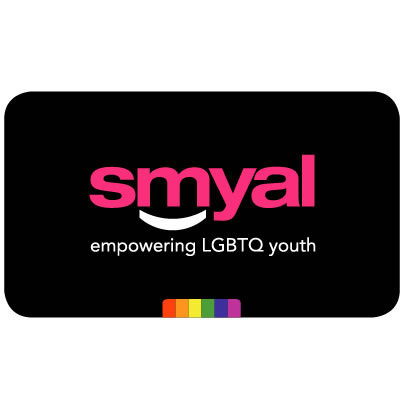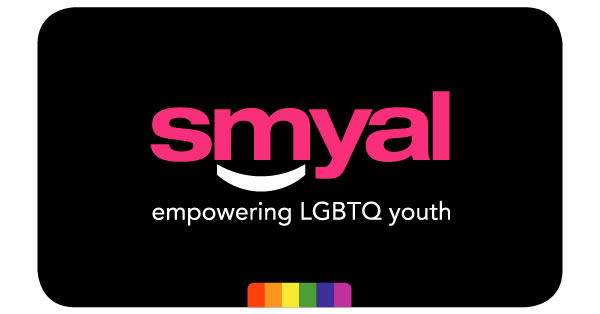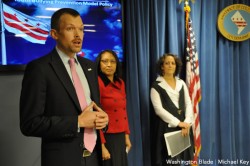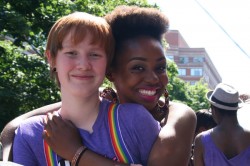Local
D.C. LGBT youth group rebrands itself
Regional GSA network part of SMYAL’s new strategic plan


(Image courtesy of SMYAL)
SMYAL on Thursday unveiled a new logo and acronym as part of its ongoing rebranding efforts.
The organization retired the blue, spiky-haired logo affectionately dubbed “Shannon” and replaced it with one that contains SMYAL in magenta print above a rainbow-colored banner and a slogan that reads “empowering LGBTQ youth.”
SMYAL, which had previously stood for Sexual Minority Youth Assistance League, is now Supporting and Mentoring Youth Advocates and Leaders.
SMYAL Executive Director Andrew Barnett told the Washington Blade in an exclusive interview on Tuesday that young people whom the organization serves and local groups with which it works increasingly found the term “sexual minority” out of touch.
“We want a name that when people see it they say ‘oh, this is something that I see myself in,” Barnett said. “The actual spelling out of the acronym was not something that people identify with anymore.”
SMYAL has worked with 7,500 young LGBT people since 1984

Andrew Barnett, executive director of SMYAL (Washington Blade photo by Michael Key)
A group of advocates and those who work with young people founded SMYAL in 1984 after they organized a conference on LGBT youth issues after they learned cross-dressing students had been admitted to St. Elizabeth’s Hospital in D.C. The organization has subsequently provided direct services to more than 7,500 young LGBT people from the nation’s capital, Prince George’s County in Maryland and other parts of the Washington metropolitan area.
SMYAL in March 2012 adopted a new strategic plan that Barnett said during his organization’s annual Fall Brunch last October would allow it to identify key issues facing LGBT youth and how the organization can most effectively respond to them.
Barnett told the Blade the process of speaking with board members, staffers, clients, funding partners and donors about the new strategic plan began in July 2011. He said SMYAL also sought feedback and suggestions from other community organizations and agencies with which it partners.
“We really wanted to get an accurate and comprehensive picture of SMYAL and LGBTQ youth in the region and what makes sense for us as the next step for our organization,” Barnett said.
Barnett said it quickly became clear SMYAL’s after school programs were providing “really great support for youth.” He added his organization has heard from a lot of young people who said they were interested in attending them.
“At SMYAL we’re providing really great opportunities for youth to engage in social activities with their peers and engage in positive youth development,” Barnett said. “They feel like they’re part of the community [and] ultimately they can grow into happy, healthy and productive adults.”
The average age an LGBT person comes out is 13; but many of them cannot attend SMYAL programs that take place at the organization’s youth center on 7th Street, S.E., near Eastern Market because they are involved with other after-school programs, cannot get to a Metro station or are not ready to come out to their parents.
“We also want to expand our ability to provide programming outside of the four walls of SMYAL,” Barnett said. “We want to bring those safe spaces and opportunities for youth leadership development to other places in our community.”
Barnett further pointed LGBT young people continue to experience disproportionate rates of bullying and harassment in school.
The Gay, Lesbian and Straight Education Network’s 2011 National School Climate Survey reported 81.9 percent of students said their classmates verbally harassed them because of their sexual orientation. Nearly a fifth of them said they were physically assaulted on campus because they are gay.
The GLSEN report also found roughly two-thirds of LGBT students had experienced verbal harassment because of their gender identity and expression — 12.4 percent of them said their classmates physically attacked them at school. Nearly 30 percent of LGBT students said they skipped class at least once because they did not feel safe at school.
GLSEN and other advocates also note LGBT students are more likely to face suspension or other disciplinary actions in school than their straight classmates.
SMYAL launches regional gay-straight alliance network

SMYAL youth (Photo courtesy of SMYAL)
One of the ways SMYAL hopes to expand beyond the organization’s drop-in center near Eastern Market is through its D.C. Regional GSA (Gay-Straight Alliance) Network it launched last month.
Working in collaboration with the San Francisco-based Gay-Straight Alliance Network that coordinates more than 900 GSAs throughout California, the SMYAL initiative seeks to support and strengthen the 77 groups in the D.C. metropolitan area. The organization hopes to achieve this goal through an activist camp in August, its annual GSA conference that takes place each fall and trainings with individual clubs and their members at their schools.
SMYAL in 2011 hosted a GSA Network gathering that drew more than 75 young LGBT advocates and GSA sponsors from 20 states. The organization last November also hosted 78 student leaders from across the region at its first GSA conference.
Barnett is also a member of D.C. Public Schools’ LGBTQ Steering Committee.
“We know that GSAs or gay-straight alliances are really effective ways for us to make schools safer for LGBTQ students,” Barnett said.
He added the D.C. Regional GSA Network takes into account the goal set forth in its new strategic plan to expand its programming beyond its youth center.
“We also saw that there was a huge unmet need throughout our region for youth who weren’t able to access programming at SMYAL,” Barnett said. “They didn’t have access to any other programming.”
Barnett said he feels SMYAL’s rebranding efforts will better position it to expand its reach in the D.C. metropolitan area in the years to come.
“It’s a chance for us to take a big step forward in better meeting the needs of LGBT youth throughout the region, which is at the heart of our mission,” he said.

In an official statement released at the reveal event Capital Pride Alliance described its just announced 2026 Pride theme of “Exist, Resist, Have the Audacity” as a “bold declaration affirming the presence, resilience, and courage of LGBTQ+ people around the world.”
The statement adds, “Grounded in the undeniable truth that our existence is not up for debate, this year’s theme calls on the community to live loudly and proudly, stand firm against injustice and erasure, and embody the collective strength that has always defined the LGBTQ+ community.”
In a reference to the impact of the hostile political climate, the statement says, “In a time when LGBTQ+ rights and history continue to face challenges, especially in our Nation’s Capital, where policy and public discourse shape the future of our country, together, we must ensure that our voices are visible, heard, and unapologetically centered.”
The statement also quotes Capital Pride Alliance CEO and President Ryan Bos’s message at the Reveal event: “This year’s theme is both a declaration and a demand,” Bos said. “Exist, Resist, Have Audacity! reflects the resilience of our community and our responsibility to protect the progress we’ve made. As we look toward our nation’s 250th anniversary, we affirm that LGBTQ+ people have always been and always will be part of the United States’s history, and we will continue shaping its future with strength and resolve,” he concluded.
District of Columbia
Capital Pride board member resigns, alleges failure to address ‘sexual misconduct’
In startling letter, Taylor Chandler says board’s inaction protected ‘sexual predator’

Taylor Lianne Chandler, a member of the Capital Pride Alliance Board of Directors since 2019 who most recently served as the board’s secretary, submitted a letter of resignation on Feb. 24 that alleges the board has failed to address instances of “sexual misconduct” within the Capital Pride organization.
The Washington Blade received a copy of Chandler’s resignation letter one day after she submitted it from an anonymous source. Chandler, who identifies as transgender and intersex, said in an interview that she did not send the letter to the Blade, but she suspected someone associated with Capital Pride, which organizes D.C.’s annual LGBTQ Pride events, “wants it out in the open.”
“It is with a heavy heart, but with absolute clarity, that I submit my resignation from the Capital Pride Alliance Board of Directors effective immediately,” Chandler states in her letter. “I have devoted nearly ten years of my life to this organization,” she wrote, pointing to her initial involvement as a volunteer and later as a producer of events as chair of the organization’s Transgender, Gender Non-Conforming, and Intersex Committee.
“Capital Pride once meant something profound to me – a space of safety, visibility, and community for people who have often been denied all three,” her letter continues. “That is no longer the organization I am part of today.”
“I, along with other board members, brought forward credible concerns regarding sexual misconduct – a pattern of behavior spanning years – to the attention of this board,” Chandler states in the letter. “What followed was not accountability. What followed was retaliation. Rather than addressing the substance of what was reported, officers and fellow board members chose to chastise those of us who came forward.”
The letter adds, “This board has made its priorities clear through its actions: protecting a sexual predator matters more than protecting the people who had the courage to come forward. … I have been targeted, bullied, and made to feel like an outsider for doing what any person of integrity would do – telling the truth.”
In response to a request from the Blade for comment, Anna Jinkerson, who serves as chair of the Capital Pride board, sent the Blade a statement praising Taylor Chandler’s efforts as a Capital Pride volunteer and board member but did not specifically address the issue of alleged sexual misconduct.
“We’re also aware that her resignation letter has been shared with the media and has listed concerns,” Jinkerson said in her statement. “When concerns are brought to CPA, we act quickly and appropriately to address them,” she said.
“As we continue to grow our organization, we’re proactively strengthening the policies and procedures that shape our systems, our infrastructure, and the support we provide to our team and partners,” Jinkerson said in her statement. “We’re doing this because the community’s experience with CPA must always be safe, affirming, empowering, and inclusive,” she added.
In an interview with the Blade, Chandler said she was not the target of the alleged sexual harassment.
She said a Capital Pride investigation identified one individual implicated in a “pattern” of sexual harassment related behavior over a period of time. But she said she was bound by a Non-Disclosure Agreement (NDA) that applies to all board members and she cannot disclose the name of the person implicated in alleged sexual misconduct or those who came forward to complain about it.
“It was one individual, but there was a pattern and a history,” Chandler said, noting that was the extent of what she can disclose.
“And I’ll say this,” she added. “In my opinion, with gay culture sometimes the touchy feely-ness that goes on seems to be like just part of the culture, not necessarily the same as a sexual assault or whatever. But at the same time, if someone does not want those advances and they’re saying no and trying to push you away and trying to avoid you, then it makes it that way regardless of the culture.”
When asked about when the allegations of sexual harassment first surfaced, Chandler said, “In the past year is when the allegation came forward from one individual. But in the course of this all happening, other individuals came forward and talked about instances – several which showed a pattern.”
Chandler’s resignation comes about five months after Capital Pride Alliance announced in a statement released in October 2025 that its then board president, Ashley Smith, resigned from his position on Oct. 18 after Capital Pride became aware of a “claim” regarding Smith. The statement said the group retained an independent firm to investigate the matter, but it released no further details since that time. Smith has declined to comment on the matter.
When asked by the Blade if the Smith resignation could be linked in some way to allegations of sexual misconduct, Chandler said, “I can’t make a comment one way or the other on that.”
Chandler’s resignation and allegations come after Capital Pride Alliance has been credited with playing the lead role in organizing the World Pride celebration hosted by D.C. in which dozens of LGBTQ-related Pride events were held from May through June of 2025.
The letter of resignation also came just days before Capital Pride Alliance’s annual “Reveal” event scheduled for Feb. 26 at the Hamilton Hotel in which the theme for D.C.’s June 2026 LGBTQ Pride events was to be announced along with other Pride plans.
District of Columbia
Capital Stonewall Democrats elect new leaders
LGBTQ political group set to celebrate 50th anniversary

Longtime Democratic Party activists Stevie McCarty and Brad Howard won election last week as president and vice president for administration for the Capital Stonewall Democrats, D.C.’s largest local LGBTQ political organization.
In a Feb. 24 announcement, the group said McCarty and Howard, both of whom are elected DC Advisory Neighborhood Commissioners, ran in a special Capital Stonewall Democrats election to fill the two leadership positions that became vacant when the officers they replaced resigned.
Outgoing President Howard Garrett, who McCarty has replaced, told the Washington Blade he resigned after taking on a new position as chair of the city’s Ward 1 Democratic Committee. The Capital Stonewall Democrats announcement didn’t say who Howard replaced as vice president for administration.
The group’s website shows its other officers include Elizabeth Mitchell as Vice President for Legislative and Political Affairs, and Monica Nemeth as Treasurer. The officer position of secretary is vacant, the website shows.
“As we look toward 2026, the stakes for D.C. and for LGBTQ+ communities have never been clearer,” the group’s statement announcing McCarty and Howard’s election says. “Our 50th anniversary celebration on March 20 and the launch of our D.C. LGBTQ+ Voter’s Guide mark the beginning of a major year for endorsements, organizing, and coalition building,” the statement says.
McCarty said among the organization’s major endeavors will be holding virtual endorsement forums where candidates running for D.C. mayor and the Council will appear and seek the group’s endorsement.
Founded in 1976 as the Gertrude Stein Democratic Club, the organization’s members voted in 2021 to change its name to Capital Stonewall Democrats. McCarty said the 50th anniversary celebration on March 20, in which D.C. Mayor Muriel Bowser and members of the D.C. Council are expected to attend, will be held at the PEPCO Gallery meeting center at 702 8th St., N.W.

















